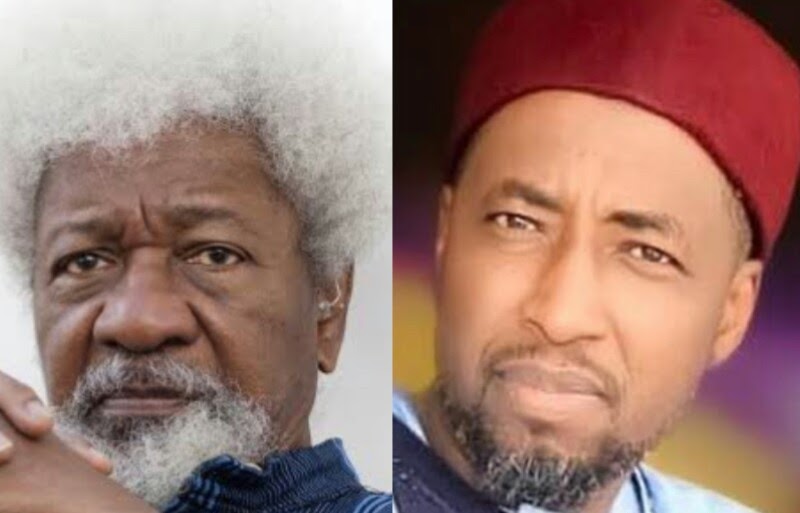Wole Soyinka, Ibrahim Maqary and western neo-paganism
By Ibrahim Ado-Kurawa Wole Soyinka is a Nobel Laureate who won the high prize for his work on drama where he excelled. But as everyone knows, no one who opposes western ideas will win that prize. In fact those who oppose their indigenous worldviews are more likely to win it. A good example is Neguib […]

By Ibrahim Ado-Kurawa
Wole Soyinka is a Nobel Laureate who won the high prize for his work on drama where he excelled. But as everyone knows, no one who opposes western ideas will win that prize. In fact those who oppose their indigenous worldviews are more likely to win it. A good example is Neguib Mahfouz, the Egyptian anti-Islamic intellectual. Ibrahim Maqary on the other hand is an Islamic scholar who became prominent at a very young age because of his proficiency and erudition. They are from divergent backgrounds. Soyinka was nurtured in the neo-pagan western intellectual tradition. Maqary was nurtured in the Muslim intellectual tradition of Sudanic Africa.
The neo-pagan Western Civilisation sometimes referred to as Western Christian Civilisation considers itself as the superior civilisation and all others must judge their practices according to its criteria. The West since enlightenment has continuously incorporated pagan traditions hence the conclusion by Roberts (1996: 583) that, “Europe once coterminous with Christendom is now post Christian and neo-pagan”. The Islamic and Sinic worlds have resisted western intellectual domination. Therefore, Ibrahim Maqary and other Muslim scholars always speak their minds damning the irritation of western neo-pagan inspired scholars.
Soyinka will insist that he is independent but this is not true. His ideas of freedom are not original but largely influenced by western neo-paganism. He is not even a pan Africanist compared to Walter Rodney, Ngugi and Franz Fanon who resisted colonialism. He was only engaged in sophistry, which is a form of intellectual cowardice. Yes, there are elements of African traditionalism in his ideas but they are those acceptable to the West. They include his anti-Islamic and anti-Muslim postures. He supports animism in Muslim majority Yoruba land. Hence despite his liberal pretensions, he never opposed the killings of innocent Hausa Muslims in Yoruba land by Sunday Igboho and other Oduduwa terrorists as much as he opposed the extra-judicial killing of Deborah.
Why has the neo-pagan West become so inhuman despite the fact that man has been the pivot of its philosophy since the Renaissance? This could only be understood within the context of European history and the abolition of Christianity and entrenchment of secularism. Jesus (peace be upon him) did not come to destroy the Law of Moses but to confirm it and give glad tidings of the coming of Ahmad (SAW) the last Prophet. Therefore his followers remained Jews until the conversion of Paul. And eventually, Jewish-Christians under the leadership of James who upheld the Law were obliterated (Wilson 1984: 126-7). This paved the way for emphasising only the teachings of Jesus relating to personal piety and people were encouraged to regard Caesar as supreme in worldly matters (Mark 7: 17). Subsequently, Christianity became the official religion of the Roman Empire and the clergy wielded power and influenced decisions. During the theocratic phase in some areas, the clergy ruled and the Pope, as the head of the Christendom, crowned the kings and emperors. The Church abused this privilege because Pauline Christianity was not equipped for this purpose. This necessitated a reformation led by the protestant fathers. In most parts of Europe, the clergy were made to revert to the position Paul intended for them. Many scholars have shown how protestant ethics led to capitalism (Raghuram 1999: 236). The Catholic in Europe also followed these steps and the influence of religion in public life was gradually reduced. Europeans believe they were backward in the Dark Ages because of the influence of the clergy, which caused the “Christian disease” (Lewis 2002).
With the curing of the “Christian disease”, religion became marginalised in Europe and there was a shift from God as the pivot of philosophy to Man (Aminrazavi 1996: 384). This was the Enlightenment philosophy. According to Kant, one of the greatest Enlightenment philosophers, this current facilitated the emergence of man from his self-imposed infancy and inability to use his reason without the guidance of another (Inwood 1995: 236-237). The Enlightenment philosophy preached equality of citizens of the nation but encouraged brutality and even genocide against others. For e.g., the French revolution, which was a product of enlightenment that gave birth to the republic, based on “liberty, equality and fraternity” but it restored slavery after it jailed Toussant L’Ouverture the leader of the revolt in Haiti who was inspired by the French revolution (Time, Dec. 31, 1999 p. 164). This shift from God to Man led to the atrocities committed by westerners who came to regard themselves as superior and all others as expendable. They lost the compassion of Christianity and became Christians in name only. And they were always willing to use Christian missionaries for this agenda. The missionaries who were extremists as confirmed by Pope Paul VI were also willing to be associated with the European imperialists because they regarded all non-Christians as heathen. The public aspect of Christianity was abolished because the clergy misused the privilege. This was why Roy made his statement: “Secularism and politics are born of a closing of Christian thought onto itself” (Roy 1994: 8). Fukuyama (1992: 216) also observed that: “Christianity in a certain sense had to abolish itself through a secularisation of its goals before liberalism could emerge”. This made it possible for some western Christians to hate others and commit the worst crimes: colonialism and Nazism. More than fifty million people lost their lives during the western-inspired Second World War, the worst in human history.
Concluded on http://www.dailytrust.com.ng
Ado-Kurawa is the Editor, Nigeria Year Book and Who is Who
